英语单词词性和判断技巧解析
英语词汇词性辨析方法
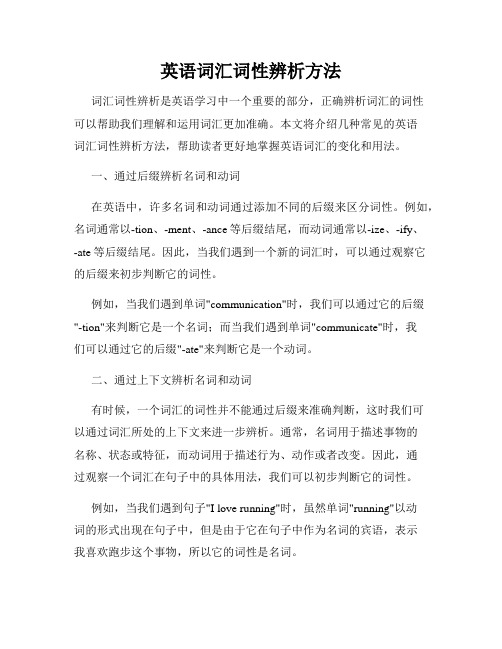
英语词汇词性辨析方法词汇词性辨析是英语学习中一个重要的部分,正确辨析词汇的词性可以帮助我们理解和运用词汇更加准确。
本文将介绍几种常见的英语词汇词性辨析方法,帮助读者更好地掌握英语词汇的变化和用法。
一、通过后缀辨析名词和动词在英语中,许多名词和动词通过添加不同的后缀来区分词性。
例如,名词通常以-tion、-ment、-ance等后缀结尾,而动词通常以-ize、-ify、-ate等后缀结尾。
因此,当我们遇到一个新的词汇时,可以通过观察它的后缀来初步判断它的词性。
例如,当我们遇到单词"communication"时,我们可以通过它的后缀"-tion"来判断它是一个名词;而当我们遇到单词"communicate"时,我们可以通过它的后缀"-ate"来判断它是一个动词。
二、通过上下文辨析名词和动词有时候,一个词汇的词性并不能通过后缀来准确判断,这时我们可以通过词汇所处的上下文来进一步辨析。
通常,名词用于描述事物的名称、状态或特征,而动词用于描述行为、动作或者改变。
因此,通过观察一个词汇在句子中的具体用法,我们可以初步判断它的词性。
例如,当我们遇到句子"I love running"时,虽然单词"running"以动词的形式出现在句子中,但是由于它在句子中作为名词的宾语,表示我喜欢跑步这个事物,所以它的词性是名词。
三、通过词义辨析形容词和副词形容词用于修饰名词,描述事物的特征或状态,而副词用于修饰动词、形容词或其他副词,描述行为的方式、程度或频率。
因此,通过观察一个词汇在句子中所起的修饰作用,我们可以初步判断它的词性。
例如,当我们遇到句子"She sings beautifully"时,单词"beautifully"用于修饰动词"sings",描述她的歌唱方式,所以它的词性是副词。
英语词性词汇用法辨析技巧

英语词性词汇用法辨析技巧词性在英语中扮演着至关重要的角色,它可以决定一个单词的用法并在句子中发挥不同的功能。
为了更好地理解和运用英语词汇,我们需要掌握一些辨析词性的技巧。
本文将为大家介绍一些常见的英语词性辨析问题,并提供一些实用的技巧。
1. 名词(Noun)和动词(Verb)的区分名词和动词是英语中最基本的两种词性。
在辨析名词和动词时,可通过以下几个方面来判断:1.1. 句子结构:名词通常以作主语、宾语、表语等角色出现;而动词则表示动作或状态的发生。
例1:The cat runs.(名词作主语)例2:He likes playing tennis.(动词表示动作)1.2. 词义:名词描述事物的名称或实体,而动词则表示行为、状态或事件。
例1:Education is important.(名词描述事物名称)例2:I am learning English.(动词描述动作或状态)1.3. 词形转换:名词和动词之间可以通过词形转换来辨析。
例1:Have you read this book?(名词)例2:I like to read.(动词)2. 形容词(Adjective)和副词(Adverb)的区分形容词和副词也是常见的词性,在辨析时可以考虑以下几个方面:2.1. 修饰对象:形容词通常修饰名词,而副词则修饰动词、形容词或其他副词。
例1:She is a beautiful girl.(形容词修饰名词)例2:He runs quickly.(副词修饰动词)2.2. 词义:形容词描述名词的特征或性质,而副词则描述动作的方式、程度等。
例1:He is a careful driver.(形容词描述特征)例2:She speaks slowly.(副词描述方式)2.3. 词形转换:形容词和副词之间可以通过词形转换来辨析。
例1:She is a quick learner.(形容词)例2:She learns quickly.(副词)3. 介词(Preposition)和连词(Conjunction)的区分介词和连词在句子中具有不同的功能,可以通过以下几个方面来判断:3.1. 连接成分:连词通常用于连接两个句子、短语或单词,起到连接的作用;而介词则与名词或代词搭配使用,表示关系。
英语单词词性

英语单词词性英语里的词汇分为10种词性,分别是:n.名词v.动词pron.代词adj.形容词adv.副词num.数词art.冠词prep.介词conj.连词int.感叹词。
可分为两大类:实词:表示实在意义的词,有名词、动词、形容词、数词、量词、代词、副词.虚词:不表示实在意义而表示语法意义的词,有:介词、连词、助词、叹词.词性一、单词词性(一)、名词(nouns)n.名词是词性的一种,也是实词的一种,是指代人、物、事、时、地、情感、概念等实体或抽象事物的词。
名词可以分为专有名词(Proper Nouns和普通名词(Common Nouns)。
专有名词是某个(些)人,地方,机构等专有的名称,如Beijing,China等;普通名词是一类人或东西或是一个抽象概念的名词,如:book,sadness等。
1、可数名词的复数形式名词复数的规则变化:一般加s或es名词复数的不规则变化:1)child---children foot---feet tooth---teeth mouse---mice man---menwoman---women2)单复同形如:deer,sheep,fish,Chinese,Japanese3)集体名词,以单数形式出现,但实为复数。
如: people police cattle 等本身就是复数,不能说 a people,a police,a cattle,但可以说a person,a policeman,a head of cattle, the English,the British,the French,the Chinese,the Japanese,the Swiss 等名词,表示国民总称时,作复数用。
2、名词的格在英语中有些名词可以加"'s"来表示所有关系,带这种词尾的名词形式称为该名词的所有格,如:a teacher's book。
英语单词词性-怎样分辨英语单词词性
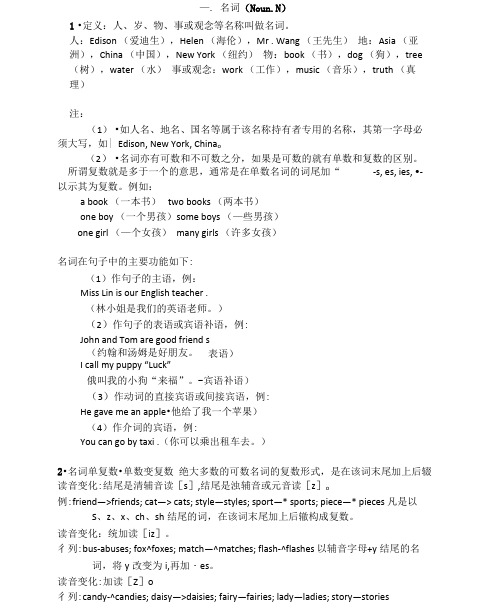
—. 名词(Noun.N)1•定义:人、岁、物、事或观念等名称叫做名词。
人:Edison (爱迪生),Helen (海伦),Mr . Wang (王先生)地:Asia (亚洲),China (中国),New York (纽约)物:book (书),dog (狗),tree (树),water (水)事或观念:work (工作),music (音乐),truth (真理)注:(1)•如人名、地名、国名等属于该名称持有者专用的名称,其第一字母必须大写,如| Edison, New York, China o(2)•名词亦有可数和不可数之分,如果是可数的就有单数和复数的区别。
所谓复数就是多于一个的意思,通常是在单数名词的词尾加“-s, es, ies, •-以示其为复数。
例如:a book (一本书)two books (两本书)one boy (一个男孩)some boys (—些男孩)one girl (—个女孩)many girls (许多女孩)名词在句子中的主要功能如下:(1)作句子的主语,例:Miss Lin is our English teacher .(林小姐是我们的英语老师。
)(2)作句子的表语或宾语补语,例:John and Tom are good friend s(约翰和汤姆是好朋友。
表语)I call my puppy “Luck”俄叫我的小狗“来福”。
-宾语补语)(3)作动词的直接宾语或间接宾语,例:He gave me an apple•他给了我一个苹果)(4)作介词的宾语,例:You can go by taxi .(你可以乘出租车去。
)2•名词单复数•单数变复数绝大多数的可数名词的复数形式,是在该词末尾加上后辍读音变化:结尾是清辅音读[s],结尾是浊辅音或元音读[z]o例:friend—>friends; cat—> cats; style—styles; sport—* sports; piece—* pieces 凡是以S、z、x、ch、sh结尾的词,在该词末尾加上后辙构成复数。
英语单词词性和判断技巧(2)

英语单词词性词性尾缀其实很多,大家主要记住最常用的1. 名词后缀1)-or/er/ess/crat/cis:做某件事情或职业的人或物:worker, debtor2)-acy, 表示"性质,状态,境遇" democr acy, accura cy, diplom acy3)-ance, -ence表示"性质,状况,行为,过程,总量,程度” import ance, dilige nce, differ ence, obedie nce4)-ancy, -ency, 表示"性质,状态,行为,过程" freque ncy, urgenc y, effici ency,5)-bility, 表示"动作,性质,状态" possib ility, flexib ility, feasib ility,6)-dom, 表示"等级,领域,状态" freedo m, kingdo m, wisdom7)-hood, 表示"资格,身份, 年纪,状态" childh ood, manhoo d, falseh ood8)-ion, -sion, -tion, -ation, -ition,表示"行为的过程,结果,状况" action, soluti on, conclu sion, destru ction, expres sion, correc tion9)-ism, 表示"制度,主义,学说,信仰,行为" social ism, critic ism, colloq uiali sm, herois m10)-ity, 表示"性质,状态,程度” purity, realit y, abilit y, calami ty11)-ment, 表示"行为,状态,过程,手段及其结果 treatm ent, moveme nt, judgme nt, punish ment, argume nt12)-ness, 表示"性质,状态,程度" goodne ss, kindne ss, tiredn ess, friend lines s13)-ship, 表示"情况,性质,技巧,技能及身份,职业” hardsh ip, member ship, friend ship14)-th, 表示"动作,性质,过程,状态" depth, wealth, truth, length, growth15)-tude, 表示"性质,状态,程度" latitu de, altitu de(海拔)16)-ure, 表示"行为,结果" exposu re, pressu re, failur e, proced ure(手续),17-grapy,表示"……学,写法” biogra phy, callig raphy, geogra phy18)-ic, ics, 表示"……学……法" logic, mechan ics, electr onics, lingui stics19)-ology,表示"……学……论”biolog y, zoolog y, techno logy(工艺学)20)-nomy, 表示"……学……术" astron omy, econom y, bionom y(生态学)2. 形容词后缀(1)带有“属性,倾向,相关”的含义1)-able, -ible, visibl e, flexib le2)名词-ish, foolis h, bookis h, selfis h(注意accomplis h, vanish)3)-ive, active, sensit ive, produc tive4)-like, manlik e, childl ike5)名词-ly, manly, father ly, schola rly, mother ly6)-some, troubl esome, handso me7)-ful, beauti ful, wonder ful, helpfu l, truthf ul8)-ous, danger ous, genero us, courag eous, variou s9)-ent, violen t10)-most, foremo st, topmos t11)less, 表示否定,countl ess, stainl ess, wirele ss3. 动词后缀1)-ize, ise, 表示"做成,变成,……化“modern ize, mechan ize, democr atize, organi ze2)-en, 表示"使成为,引起,使有” quicke n, weaken, soften, harden3)-fy, 表示"使……化, 使成”beauti fy, purify, intens ify, signif y, simpli fy4)-ish, 表示"使,令” finish, abolis h, dimini sh, establ ish5)-ate, 表示“成为……,处理,作用” separa te, operat e, indica te4. 副词后缀(形容词)-ly:bad→badly坏地/恶劣地,carefu l→carefu lly小心地-wise(OE):clock→clockw ise(a./adv.)顺时针方向的(地);like→likewi se同样地-wards:out→outwar ds向外面地,north→northw ards向北方地单词词性判断可以在词义的理解及书写句子方面帮助学生。
英语选词填空技巧解析
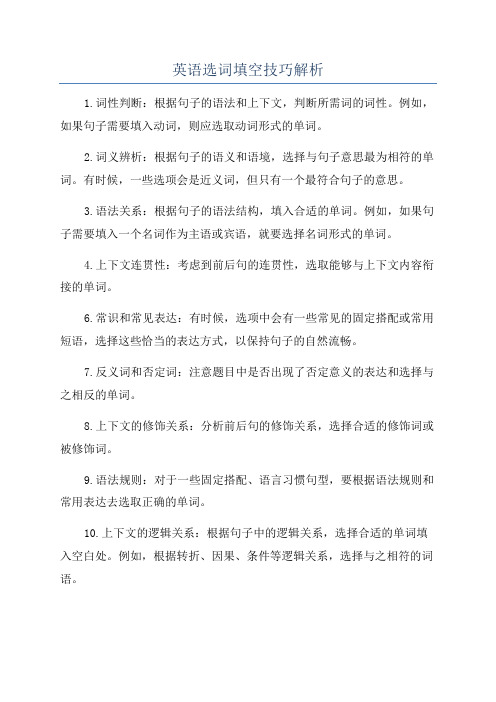
英语选词填空技巧解析
1.词性判断:根据句子的语法和上下文,判断所需词的词性。
例如,如果句子需要填入动词,则应选取动词形式的单词。
2.词义辨析:根据句子的语义和语境,选择与句子意思最为相符的单词。
有时候,一些选项会是近义词,但只有一个最符合句子的意思。
3.语法关系:根据句子的语法结构,填入合适的单词。
例如,如果句子需要填入一个名词作为主语或宾语,就要选择名词形式的单词。
4.上下文连贯性:考虑到前后句的连贯性,选取能够与上下文内容衔接的单词。
6.常识和常见表达:有时候,选项中会有一些常见的固定搭配或常用短语,选择这些恰当的表达方式,以保持句子的自然流畅。
7.反义词和否定词:注意题目中是否出现了否定意义的表达和选择与之相反的单词。
8.上下文的修饰关系:分析前后句的修饰关系,选择合适的修饰词或被修饰词。
9.语法规则:对于一些固定搭配、语言习惯句型,要根据语法规则和常用表达去选取正确的单词。
10.上下文的逻辑关系:根据句子中的逻辑关系,选择合适的单词填入空白处。
例如,根据转折、因果、条件等逻辑关系,选择与之相符的词语。
总之,解答英语选词填空题要根据句子的上下文、语法和逻辑关系进行综合分析和判断,选择与句子意思最为相符合的选项。
实践中还需要不断积累词汇和理解语境的能力,加强对英语单词的熟练运用。
初中英语判断英语词性的方法
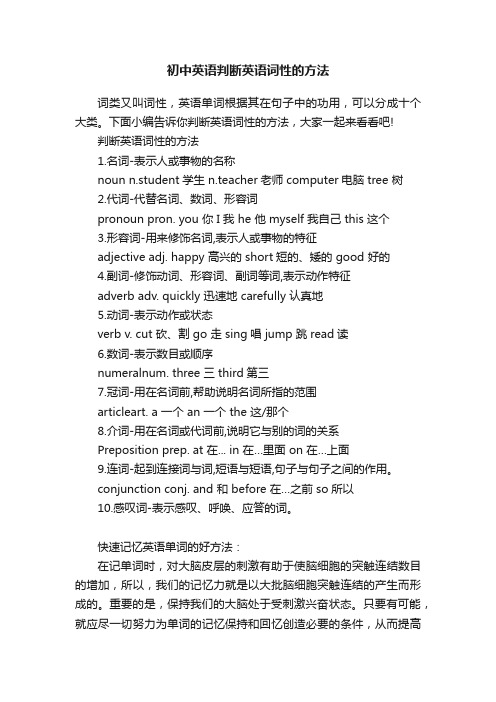
初中英语判断英语词性的方法词类又叫词性,英语单词根据其在句子中的功用,可以分成十个大类。
下面小编告诉你判断英语词性的方法,大家一起来看看吧!判断英语词性的方法1.名词-表示人或事物的名称noun n.student学生 n.teacher老师 computer电脑 tree 树2.代词-代替名词、数词、形容词pronoun pron. you 你 I 我 he 他 myself 我自己 this 这个3.形容词-用来修饰名词,表示人或事物的特征adjective adj. happy 高兴的 short短的、矮的 good 好的4.副词-修饰动词、形容词、副词等词,表示动作特征adverb adv. quickly 迅速地 carefully 认真地5.动词-表示动作或状态verb v. cut 砍、割 go 走 sing唱 jump 跳 read读6.数词-表示数目或顺序numeralnum. three 三 third第三7.冠词-用在名词前,帮助说明名词所指的范围articleart. a 一个 an 一个 the 这/那个8.介词-用在名词或代词前,说明它与别的词的关系Preposition prep. at 在... in 在…里面 on 在…上面9.连词-起到连接词与词,短语与短语,句子与句子之间的作用。
conjunction conj. and 和 before 在…之前 so所以10.感叹词-表示感叹、呼唤、应答的词。
快速记忆英语单词的好方法:在记单词时,对大脑皮层的刺激有助于使脑细胞的突触连结数目的增加,所以,我们的记忆力就是以大批脑细胞突触连结的产生而形成的。
重要的是,保持我们的大脑处于受刺激兴奋状态。
只要有可能,就应尽一切努力为单词的记忆保持和回忆创造必要的条件,从而提高单词的记忆效率。
为达此目的,可采取以下途径和方法:(1)制定一个记忆单词的学习计划,有计划有目的地增加大脑对外语信息的记忆容量;(2)尽一切可能参加能增强记忆力的各项活动,随时随地地说外语,用外语,利用一切机会人为地创造语言环境;(3)做到在单词的记忆保持效果趋于下降之前及时进行复习;(4)要更多地使用你的右脑,即通过实物、画图、模型和颜色充分发挥能增强你记忆的那个大脑半球的作用。
英语四级选词填空高分技巧:如何确定词性汇总一篇

英语四级选词填空高分技巧:如何确定词性汇总一篇英语四级选词填空高分技巧:如何确定词性 1首先,名词的确定。
一般情况下,当文中出现a/an/the/adj./prep+( ). 的时候,空格处可以考虑填名词。
例如:2013年12月的真题,首先我们把15个词进行分类:名词:C、demand需求,要求;E、experience经验;G、graduates毕业生;H、operations运作,手术;L、ension紧张,张力;N、view观点,看法,景色动词:B、applied适用,应用;C、demand要求,需求;F、explores,探索,探究;I、promote促进,提升;J、qualifies使。
合格,取得资格;M、trained训练,培训;N、view考虑,看待O、worsens 恶化,变糟;形容词:A、additional附加的,额外的;D、excessive过多的,极度的;K、specialized专业的,专门的;Many students are recent( ); others are career switchers.分析:根据语境意思,此处要填名词,那么我们从名词中选择,只有G选项是符合要求的。
此题也比较简单,关键是考生要分清应填的词性。
其次,动词的确定。
动词的考察较多,主要有以下两种:1.主语后面选择填谓语动词,例如:But as the nursing shortage( ), a growing number of schools and hospitals are establishing “fast-track programs”。
解析:本句是as引导的原因状语从句,从句的主语是the nursing shortage,可以确定缺少谓语,此空应该填动词,而且是动词的单三形式,那么我们从动词栏中找只有F、J、O三个符合语法要求,然后根据上下文意思,空后意思是建立快速通道是针对护士短缺而采取的对策,此处应该是表达护士短缺现象变得“恶化”的意思,所以可以得出答案是O。
英语基础知识点判断英语词性及发音的方法整理
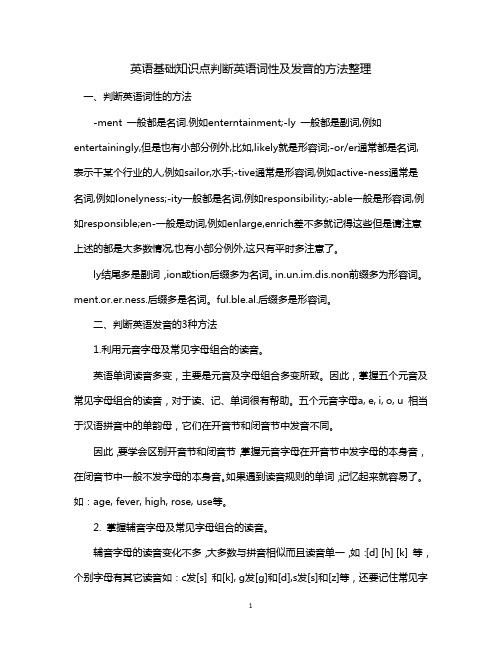
英语基础知识点判断英语词性及发音的方法整理一、判断英语词性的方法-ment 一般都是名词.例如enterntainment;-ly 一般都是副词,例如entertainingly,但是也有小部分例外,比如,likely就是形容词;-or/er通常都是名词,表示干某个行业的人,例如sailor,水手;-tive通常是形容词,例如active-ness通常是名词,例如lonelyness;-ity一般都是名词,例如responsibility;-able一般是形容词,例如responsible;en-一般是动词,例如enlarge,enrich差不多就记得这些但是请注意上述的都是大多数情况,也有小部分例外,这只有平时多注意了。
ly结尾多是副词,ion或tion后缀多为名词。
in.un.im.dis.non前缀多为形容词。
ment.or.er.ness.后缀多是名词。
ful.ble.al.后缀多是形容词。
二、判断英语发音的3种方法1.利用元音字母及常见字母组合的读音。
英语单词读音多变,主要是元音及字母组合多变所致。
因此,掌握五个元音及常见字母组合的读音,对于读、记、单词很有帮助。
五个元音字母a, e, i, o, u 相当于汉语拼音中的单韵母,它们在开音节和闭音节中发音不同。
因此,要学会区别开音节和闭音节,掌握元音字母在开音节中发字母的本身音,在闭音节中一般不发字母的本身音。
如果遇到读音规则的单词,记忆起来就容易了。
如:age, fever, high, rose, use等。
2. 掌握辅音字母及常见字母组合的读音。
辅音字母的读音变化不多,大多数与拼音相似而且读音单一,如:[d] [h] [k] 等,个别字母有其它读音如:c发[s] 和[k], g发[g]和[d],s发[s]和[z]等,还要记住常见字母组合的读音,如sh发[∫],ch发[ts],tr发[tr],dr发[dr],ck发[k]等。
3. 掌握划分音节的方法记忆长单词。
英语词性的分类及用法详解

找规律
NOUN. 要点考点聚焦
potatoes
heroes
tomatoes
2021/3/9
10
不规则变化
NOUN.
man--men
child--children
woman--women
goose--geese
2021/3/9
deer
sheep
11
典型例题解析
NOUN.
1.Several _____ are talking under the tree.And they are__C____.
Article (art.)
Verb (v.)
Preposition (prep.)
Conjunction (conj.)
Interjection (interj.)
用在名词前,帮助说明名词所 指的人或事物 表示人或事物的动作或状态
用在名词、代词等前面,说明 句子中词与词之间的关系
an,a,the
eat吃 have有 under在。。。。。。下 in在。。。。。。里
5. This is B bedroom. The twin sister like it very much.
A. Ann and Jane B. Ann and Jane’s C.Ann’s and Jane’s
2021/3/9
12
根据所给单词的正确形式填空:
NOUN.
1. Different people may have different _id_e_a_s_. (idea)
以辅音字母+y 变y 为i再加es baby---babies
结尾的词
2021/3/9
初中英语语法单词词性知识点总结归纳及词性转换规律

初中英语单词词性知识点总结及词性转换规律1.名词(1)名词的可数与不可数可数名词指表示的人或事物可以用数来计量,它有单数与复数两种形式。
不可数名词指所表示的事物不能用数来计量。
物质名词与抽象名词一般无法用数目,来统计,都成为不可数名词。
不可数名词前一般不能用冠词a、an来表示数量,没有复数形式。
要表示“一个……”这一概念,就须加a piece of这一类短语。
要注意许多名词在汉语里看来是可数名词,在英语里却不可数。
如:chalk,paper,bread,rice,grass,news 等。
(2)名词复数的规则变化A.一般情况下加-s。
B.以s, x, ch, sh,结尾的加-esC.以辅音字母加y结尾的改y为i再加-esD.以f,fe结尾的,去掉f或fe,变成v再加-es(3)名词的所有格A.单数名词词尾加’s,复数名词词尾若没有s,也要加’s。
如:the worker's bike,the Children’ s ballB.表示几个人共有一样东西,只需在最后一个人的名字后加’s若表示各自所有,则需在各个名字后’ s。
如:This is Lucy and Licy’ s room.These are Kate's and jack’ s rooms.C.如果是通过在词尾加一s构成的复数形式的名词,只加‘。
如:the students' books, the girls' blouses(另外:名词+of+名词名词是有生命的,我们就用's结构来表示所有关系。
如果名词所表示的事物是无生命的,我们就要用名词+of+名词的结构来表示所有关系。
)2.代词人称代词,物主代词,反身代词,指示代词,不定代词(1)人称代词第一人称单数I me my mine myself复数we us our ours ourselves第二人称单数you you your yours yourself复数you you your yours yourselves第三人称单数he him his his himselfshe her her hers herselfit it its its itself复数they them their theirs themselves(2)物主代词物主代词的用法:形容词性物主代词后面一定要跟上一个名词;名词性物主代词可作主语、表语、宾语。
英语词性词汇用法辨析技巧
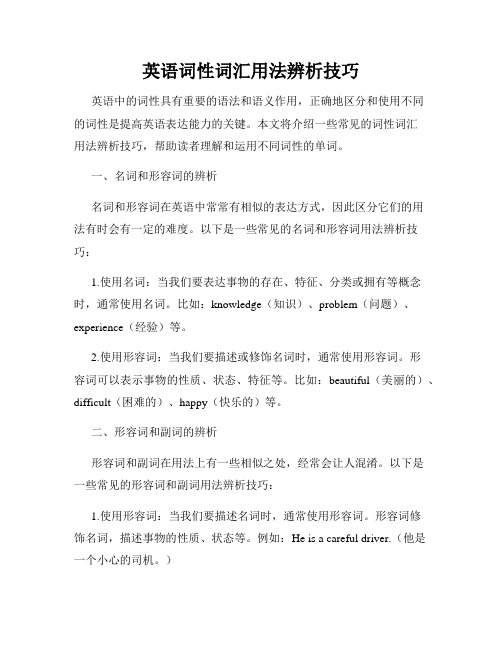
英语词性词汇用法辨析技巧英语中的词性具有重要的语法和语义作用,正确地区分和使用不同的词性是提高英语表达能力的关键。
本文将介绍一些常见的词性词汇用法辨析技巧,帮助读者理解和运用不同词性的单词。
一、名词和形容词的辨析名词和形容词在英语中常常有相似的表达方式,因此区分它们的用法有时会有一定的难度。
以下是一些常见的名词和形容词用法辨析技巧:1.使用名词:当我们要表达事物的存在、特征、分类或拥有等概念时,通常使用名词。
比如:knowledge(知识)、problem(问题)、experience(经验)等。
2.使用形容词:当我们要描述或修饰名词时,通常使用形容词。
形容词可以表示事物的性质、状态、特征等。
比如:beautiful(美丽的)、difficult(困难的)、happy(快乐的)等。
二、形容词和副词的辨析形容词和副词在用法上有一些相似之处,经常会让人混淆。
以下是一些常见的形容词和副词用法辨析技巧:1.使用形容词:当我们要描述名词时,通常使用形容词。
形容词修饰名词,描述事物的性质、状态等。
例如:He is a careful driver.(他是一个小心的司机。
)2.使用副词:当我们要描述动词、形容词或其他副词时,通常使用副词。
副词可以表示时间、地点、方式、程度等。
例如:She speaks English fluently.(她流利地说英语。
)三、动词和名词的辨析动词和名词是英语中最基本的两类词性,它们在用法上有一些区别。
以下是一些常见的动词和名词用法辨析技巧:1.使用动词:当我们要表达一个动作或者是一种状态时,通常使用动词。
动词可以表示动作的发生、进行、完成等。
例如:They swim in the pool.(他们在游泳池里游泳。
)2.使用名词:当我们要表达一个事物或者一个概念时,通常使用名词。
名词可以表示人、物、地方、时间、情感等。
例如:He is a teacher.(他是一名教师。
)四、副词和介词的辨析副词和介词的用法有时会让人困惑,以下是一些常见的副词和介词用法辨析技巧:1.使用副词:当我们要描述动词、形容词或其他副词时,通常使用副词。
转如何判断英语单词的词性
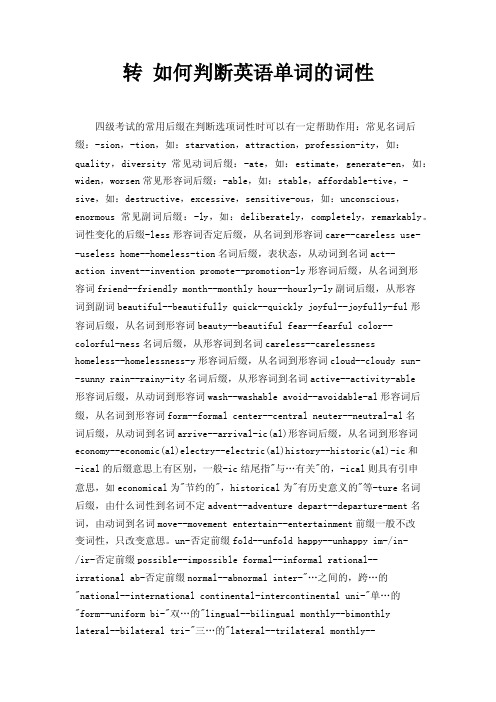
转如何判断英语单词的词性四级考试的常用后缀在判断选项词性时可以有一定帮助作用:常见名词后缀:-sion,-tion,如:starvation,attraction,profession-ity,如:quality,diversity常见动词后缀:-ate,如:estimate,generate-en,如:widen,worsen常见形容词后缀:-able,如:stable,affordable-tive,-sive,如:destructive,excessive,sensitive-ous,如:unconscious,enormous常见副词后缀:-ly,如:deliberately,completely,remarkably。
词性变化的后缀-less形容词否定后缀,从名词到形容词care--careless use--useless home--homeless-tion名词后缀,表状态,从动词到名词act--action invent--invention promote--promotion-ly形容词后缀,从名词到形容词friend--friendly month--monthly hour--hourly-ly副词后缀,从形容词到副词beautiful--beautifully quick--quickly joyful--joyfully-ful形容词后缀,从名词到形容词beauty--beautiful fear--fearful color--colorful-ness名词后缀,从形容词到名词careless--carelessnesshomeless--homelessness-y形容词后缀,从名词到形容词cloud--cloudy sun--sunny rain--rainy-ity名词后缀,从形容词到名词active--activity-able形容词后缀,从动词到形容词wash--washable avoid--avoidable-al形容词后缀,从名词到形容词form--formal center--central neuter--neutral-al名词后缀,从动词到名词arrive--arrival-ic(al)形容词后缀,从名词到形容词economy--economic(al)electry--electric(al)history--historic(al)-ic和-ical的后缀意思上有区别,一般-ic结尾指"与…有关"的,-ical则具有引申意思,如economical为"节约的",historical为"有历史意义的"等-ture名词后缀,由什么词性到名词不定advent--adventure depart--departure-ment名词,由动词到名词move--movement entertain--entertainment前缀一般不改变词性,只改变意思。
英语单词词性和判断技巧解析

英语单词词性词性尾缀其实很多,大家主要记住最常用的1. 名词后缀1-or/er/ess/crat/cis:做某件事情或职业的人或物:worker, debtor2-acy, 表示"性质,状态,境遇" democracy, accuracy, diplomacy3-ance, -ence表示"性质,状况,行为,过程,总量,程度” importance, diligence, difference, obedience4-ancy, -ency, 表示"性质,状态,行为,过程" frequency, urgency, efficiency,5-bility, 表示"动作,性质,状态" possibility, flexibility, feasibility, 6-dom, 表示"等级,领域,状态" freedom, kingdom, wisdom7-hood, 表示"资格,身份, 年纪,状态" childhood, manhood, falsehood8-ion, -sion, -tion, -ation, -ition, 表示"行为的过程,结果,状况" action, solution, conclusion, destruction, expression, correction9-ism, 表示"制度,主义,学说,信仰,行为" socialism, criticism, colloquialism, heroism10-ity, 表示"性质,状态,程度” purity, reality, ability, calamity11-ment, 表示"行为,状态,过程,手段及其结果 treatment, movement, judgment, punishment, argument12-ness, 表示"性质,状态,程度" goodness, kindness, tiredness, friendliness13-ship, 表示"情况,性质,技巧,技能及身份,职业” hardship, membership, friendship14-th, 表示"动作,性质,过程,状态" depth, wealth, truth, length, growth 15-tude, 表示"性质,状态,程度" latitude, altitude海拔16-ure, 表示"行为,结果" exposure, pressure, failure, procedure手续, 17-grapy, 表示"……学,写法” biography, calligraphy, geography18-ic, ics, 表示"……学……法" logic, mechanics, electronics, linguistics19-ology, 表示"……学……论”biology, zoology, technology工艺学20-nomy, 表示"……学……术" astronomy, economy, bionomy生态学2. 形容词后缀1带有“属性,倾向,相关”的含义1-able, -ible, visible, flexible2名词-ish, foolish, bookish, selfish注意accomplish, vanish3-ive, active, sensitive, productive4-like, manlike, childlike5名词-ly, manly, fatherly, scholarly, motherly6-some, troublesome, handsome7-ful, beautiful, wonderful, helpful, truthful8-ous, dangerous, generous, courageous, various9-ent, violent10-most, foremost, topmost11less, 表示否定,countless, stainless, wireless3. 动词后缀1-ize, ise, 表示"做成,变成,……化“modernize, mechanize, democratize, organize2-en, 表示"使成为,引起,使有” quicken, weaken, soften, harden3-fy, 表示"使……化, 使成”beautify, purify, intensify, signify, simplify4-ish, 表示"使,令” finish, abolish, diminish, establish5-ate, 表示“成为……,处理,作用” separate, operate, indicate4. 副词后缀形容词-ly:bad→badly坏地/恶劣地,careful→carefully小心地-wiseOE:clock→clockwisea./adv.顺时针方向的地;like→likewise同样地-wards:out→outwards向外面地,north→northwards向北方地单词词性判断可以在词义的理解及书写句子方面帮助学生;名词有四数:可数与不可数,单数或复数;限定与动词不可忘;四数加限定一.怎样确定名词:一般情况下在下列结构中我们可确定所缺空应为名词◇1.a/an/the +adj.+ 名词;a/the book; the rich the disabled the Smiths◇2.adj.+名词; a big stone; a long river; interesting books◇3.adv.+ adj.+名词; a very honest boy◇4.介词+名词;in the room; under construction◇5.形容词性物主代词+名词;my surprise; his honesty◇6. 数词+名词;five girls;◇7.缺的词在句中为主语,表语,宾语时多为名词; They have books.及时练习1:1.There has been a 30% growth in the ____市场 for personal computers.3.He has discovered a lot of ___________ 发现 in science .5.I am sorry that I can’t attend the __________讲座 on American history .6.She started as a successful merchant but ended up as a __________乞丐.7.There was a surprised _____________表情on her face .8.Our city has experienced great ___________变化in the past few years 9.Please give my _________祝贺when you see her .took a deep _____________ 呼吸and then dived into the water.was unable to give police a ______________描述of his attack .car was a ____________廉价货at the price.动词→名词练习:achieve add argue arrive respondretire rude save sail sell 1. market 3 discoveries 6 beggar 7. expression 8 changes 9. congratulations 10. breath 11. description 12. bargain及时练习2:指出下列文中的名词:In the early 1990s, the word “Internet” was strange to most people. But today, Internet has become a useful tool for people all over the world. Maybe Internet has been the greatest invention in the field of communication in the history of mankind人类.Communicating with others on the Internet is much faster. We can chat with a person who is sitting in the other part of the world. We can e-mail our friends and they can read the e-mails within a minute.Giving all kinds of information is probably the biggest advantage of the Internet. We can use search engines to find the information we need. Just type in a keyword or keywords and the search engine will give us a list of suitable websites to look at.We can enjoy a lot on the Internet by downloading games, visiting chat rooms or surfing 浏览websites. There are some games for free. We can meet new and interesting people in the chat now. We can also listen to music and see films.二.怎样确定名词的单数或复数;可数或不可数§ 确定名词单数或复数的方法:1.由名词前面的数词: 1. I have several ______ 书 on the shelf. 2. This bus can carry 60 乘客.2.由名词后的动词单数或复数即主谓一致: The _____ 建议 are reasonable and some of us will accept them.3.由句意: Our ______ 教授 held a meeting about how to improve our English.What is the best-known chain of fast-food 餐馆in the world.※及时练习3:判断下列名词正误:1. They often have fish, meat and vegetable for supper.2. Mrs. Smith gets well along with her neighbor.3. They had only three meal of soup every day.4. Dickens wrote Oliver Twist in the year 1837 - 1838.5. His new play was a great succeed.6. The animals are useful to the desert people in many way.7. As he explored the sea,he took picture and videos of many thing that people had never seen before.8. They were given kinds of breakfast,and sometimes they got no breakfast at all.9. School child walked with their shirts,coats and anything else they could find pulled up over their nose.10. The middle part of the 20th century brought new ways to help people get over disease.11. Too many trees have been cut this years.12. They use camels for carrying water,food,tents and another things.注意三类名词:1、总是不可数的名词:1 物质名词:furniture, equipment,2 抽象名词:advice, progress, news, fun, truth, milk, ink, rice, …2. 根据名词本身的意义:1 物质名词:water水2 抽象名词:experience经验乐事success failure pity surprise惊讶惊讶的事3. 个体名词总是可数名词:book, desk,三.限定词:限定词是位于名词或名词词组之前,对他们在特指、泛指或数量等方面起限定作用的一类词;She showed a certain elegance. The judge divorced the couple. He has got some brains智慧限定词与形容词的区别主要是:限定词只对名词起限定作用有些限定词也可用作其他词性,如代词等,而形容词则描述名词的特征、状态等:We lived in small house. → We lived in a small house.house 是个体名词,一般来说,个体名词是可数名词,有单数复数形式,单数形式的个体名词可数名词除在部分习语或固定搭配中外,一般不可单独使用,须根据具体情况与冠词、不定代词、指示代词或其它限定词连用, 或使用其复数形式;练习:改正下列错误:1. She should be able to get job in Europe.2. Mr. Blake was considered excellent music teacher.3. How did accident happen4. I will give you other chance to prove yourself.5. Do you have class this morning6. Important product of South Africa are fruit and gold.7. She is English teacher.由于动词在句中有谓语和非谓语两种形式,可根据所缺单词在句中充当的成分来判断此处是否为动词;一.一般情况下:◇1. is, am, are, was, were,◇2. will would, can could, must, may, …◇3. has…, have…, had…,don’t, didn’t, doesn’t…◇4. V+s: goes, likes, …◇5. 动词原型:want / go /以上4项为确定的谓语动词;句中有了确定的谓语动词后其它的动词形如V-ing /to do/ done-ed的为非谓语动词;You want to know about my staying in America, rightWell, to tell you the truth, it is really an eye-opening experience to study here.In China, I had English classes five times a week since fifth grade. However, I didn’t know how different textbook English could be from everyday English until I came to Hotchkiss School, Connecticut.When I first studied English, I was told to say, “I am fine.”when people say “How are you”But in the US, I found that people say, “I am good.” or “I’m tired.”One day, someone greeted me with “What’s up”It made me confused. I thought for a moment and then smiled because I didn’t know what to say.二. 谓语动词的判断:1. 主动形式:如何主语实施了谓语动作,意义完整,就是表达主动关系;He invited to the party…He invited me to the party.He was invited to the party.He was invited him to the party.2. 被动形式:如果主语没有实施谓语动词动作而是承受了该动作,应该用be + done 形式表示,只有过分只能表示被动关系;He looked this morning.The boy took to the school.The patient sent to the hospital.The shocks and fires caused by the earthquake destroyed the village.三.动词与名词的判断: 1. I'm ready to match my strength against yours.我已经准备好与你较量力气; He thought he could beat anyone at tennis, but he's met his match in her. 他以为他打网球所向无敌,但遇到她却是旗鼓相当; a football match 足球比赛2. She is the picture of her mother. 她活像她的妈妈;It is hard to picture life a hundred years ago. 我们很难想象一百年前人们的生活;3. Have you seen any good films lately 你最近看过什么好电影吗The television company is filming in our town. 电视公司正在我们镇上拍片子;若所缺单词为修饰语则考虑形容词和副词;形容词的主要句法作用为表语和定语,用来说明或修饰名词、代词的词称为形容词,据此可判断所缺是否为形容词; 副词一般主要用来修饰形容词,副词,动词或整个句子,据此可判断所缺单词是否为副词;形容词的学习:在下列结构中应该用形容词:◇a + adj + n a tall boy 写一写:______________ ____________________________◇be + adj. He is tall. 写一写:______________ ____________________________◇keep/find/make/think… it adj. t o / that ……◇be + as + adj. + as do + as + adv. + asbe so / too / very / how / however + adj. 不用adv.1形容词在句子中的句法作用及位置: ⑴ 作定语时放在名词的前面..........;形容词修饰名词;结构:a/an/ …_______ 名词Li Mei is a beautiful city girl. The new student comes from Japan.My father’s car is very expensive. The English story is veryinteresting.★ 少数形容词只能作定语这些形容词包括 little, live 活着的, elder, eldest 等,只能作定语,不能作表语;例如:正My elder brother is a doctor. 误My brother is elder than I.正This is a little house. 误The house is little.正Do you want live fish or dead one 误The old monkey is still live.★ 貌似副词的形容词:lonely, friendly, lively, lovely, likely, deadly, daily, weekly, ★ 后置的情况:①修饰复合不定代词时放在代词之后;如:Something serious has happened to him .他发生了严重的事故1. Every minute there is _____going on here.A. exciting somethingB. something excitingC. exciting anythingD. anything exciting2. This river is about 5 feet ________. A. deep B. widely C. depth D. length⑵作表语时放在连系动词之后,构成系表结构;结构:连系动词 + 形容词;如:The idea sounds great.连系动词主要有:beam, is, are, look看起来, sound听起来, smell闻起来, taste尝起来, feel感到,摸起来.结构:look / sound / smell / taste / feel / seem / … 形容词look / sound / smell / taste / feel / seem / … 副词-ly/very / so/…+形容词The soup tasted very delicious.★少数形容词只能作表语这些形容词包括ill, asleep, awake, alone, afraid, well, worth, glad, unable等,只能作表语,不能作定语;表语形容词例如:正Don’t be afraid.误Mr. Li is an afraid man.正The old man was ill yesterday.误This is an ill person.正This place is worth visiting.误That is a worth book.练习:判断下列形容词所充当的成分:1. a small German town2. a light blue sweater3. It’s nothing serious.4. He feels lonely.5. Tom is tall6. John looks so happy.2. The man looked at me with a ______ smile. A. friend B. friends C. friendly D. friendlily3. The neighbors visit the old man, so he doesn’t feel ____ at all.A. friendlyB. lovelyC. lonelyD. lively4. The flowers in the garden smell ______. A. nicely B. wonderfully C. well D. nice5. The _____ boy has been in hospital for a month. A. ill B. sick C. afraid D. alone6. Don’t eat the meat. It smells ______. A. terrible B. badly C. delicious D. good7. Here is a ____ mouse. Was it killed by your catA. dieB. diedC. deathD. deadE. deadly8. Mary looks _____ at home. A. happy B. happily C. happierD. more happyMary looks _____ at the model in the room. A. happy B. happily C. happier D. more happy9. I have_____ to do today.A. anything importantB. something importantC. important nothingD. important something10. What a ____ coughYou seem _____ill.A. terrible,terriblyB. terribly,terrible ,terrible ,terribly⑶作宾语补足语时放在宾语之后;如:We must try our best to keep our environment clean.★ keep/find/make/think+宾语+形容词作宾补练习:1. You must keep your eyes _____ when you do eye exercises. A. close B. openC. closedD. opened2. We should try our best to make our life _______. A. well B. beautifullyC. wonderfulD. bad改错:1. I’m sure we’ll have a wonderfully time together.2. The room is so noise.3. The fish has gone bad. It tastes terribly.4. I’m sure your illness is caused by something seriously.5. The mixture of coffee, milk, and sugar tastes differently from tea.⑷.“the+ 形容词”用作主语及宾语, 作主语时用作复数;The dead the living the rich the poor the blind the hungryThe old often think of old things. 老年人经常回想往事;The new always take the place of the old.新生事物总是会取代旧的事物;1 The rich ______ often greedy. A. are B. is C. was D. wereThe poor are losing hope.副词的学习一、用来说明事情发生时间、地点、原因、方式等含义或说明其它形容词或副词程度的词叫做副词;1、副词的分类:见下表时间副词频度副词地点/方位副词程度副词方式副词疑问/连接副词其他副词today, tomorrow,yesterday, now, then, early, late, once, soon, just,tonight, long,already, yet,before, ago, later, eversince after, whenever first, someday, sometime, last,oncetwicealwaysusuallyoftensometimesneverseldomeverhere, there,home, below,anywhere,above, outside,in, inside, out,back, up, downaway, off, far,near, nearby,wherevereverywhere,very, too,enough,rather, quite,how, so,much, just,nearly, onlyalmost,hardly,as long as等,even, all,a little, a bitwell,hard,alone,fast,together,suddenly,how,where,when,why,whetherhowever, etc.too, also,nor, so,as, on, off,either,yes, no,not, neithermaybe,perhaps,certainly,-ly结尾的副词关系副词以-ly结尾的词大都是副词where,why,when,副词的用法:1、修饰动词: sing happily , greet sb. politely, talk loudly, listen carefully, rain heavily, sing nicely2、修饰形容词: badly ill, truly sorry, really sorry副词的构成:① 大多数情况下由形容词 +ly: quiet---quietly correct---correctlypolite---politely② 以 le结尾的形容词: -e—y terrible—terribly, gentle—gently ,im possible—im possibly, comfortable—comfortably, simple—simply③ 以y结尾的形容词: -y—ily:easy---easily happy---happilyheavy---heavily④ 一些形容词本身也是副词: long, early, fast, hard,straight⑤ 部分形容词和副词是两个完全不同的词:good—well二、写出下列形容词的副词:1. bad2. bright 4. clear 5. soft 6. correct 7. excited 8. free 9. loud11. slow 12. close 13. polite 14. nice________ 15. possible16. gentle20. angry 24. easy25. hard 27. good 28. true 29. late三、副词在句子中的位置以及作用:★副词可以修饰动词、形容词或副词,也可放句首修饰整个句子;1修饰动词时放在该动词后主要以方式副词-ly或程度副词为主:It’s raining heavily.练习:1. He looked at it ______ again. A. care B. carefulness C. carefulD. carefully2. Please do your homework ____________________. careful3. The work isn't hard. I can finish it ____________________. easy4. The girl's voice sounds____. Maybe she can become a good singer when she grows up.A. sweetB. sweetlyC. beautifully5. The firemen have saved the boy from the fire _______________ successful.2 修饰形容词或副词时,放在该词前面;You are quite right. Don’t ride too fast. Neither Tom nor Susan can swim very well.练习:1. What a ____ cough You seem _____ ill.A. terrible, terriblyB. terribly, terribleC. terrible, terribleD. terrible, terribly2. The cheese cake tasted so _____ that the kids asked for more. A. delicious B. well C. bad D. badly3. — Whose pict ure is better, Jack’s or Tom’s— Both of them are good. I think Jack drawsTom.A. as good asB. as well asC. better thanD. worse than4. The children all looked _______ at the broken model plane and felt quite _______A. sad, sadB. sadly, sadlyC. sad, sadlyD. sadly, sad5. This math problem is _______ and I can do it _______.A. easy, easilyB. easily, easilyC. easy, easyD. easily, easy6. This kind of cake tastes _______. A. good B. well C. to be good D. to be well四、填入正确的形容词或副词注意区分形容词与副词,名词与副词,名词与形容词1. She is good at swimming. She can swim very ___________ good.2. The __________early birds get the worms虫. So, we have to get up ___________early.3. Dick walked into the living room ____________ quiet.4. Susan looked__________happy at the party.5. Marie looks ___________ happy at the cat.6. A _____ hard worker works _______ hard.7. The ____________ careful driver drives ____________ careful.1. My purse was stolen on the bus yesterday. ____________ luck, there was no money init.2. Mobile phones are _________ wide used in most of the cities in China.3. He put on his coat and went out ____________ quick.4. She is __________ good than Li Ping at swimming.5. A lot Chinese people are ___________ pride of Yao Ming, a famous basketball star inNBA.6. —One more satellite was sent up into space in China in May.—Right. The government spoke ___________ of that. high7. Allie asked me ___________ polite to put the things away.8. It’s snowing hard. You mus t drive _____________ careful.9. —This digital camera is really cheap—The ______ , the better.cheap I’m short ofmoney, you see.10. Hainan is a very large island. It’s the second ____________ large island in China.五、用所给单词的适当形式填空1. Jack get up ____________________ today than yesterday. early2. Please do your homework ____________________. careful3. He is too tired to go any ____________________. far4. Le Lei runs __________________ fast than I, but he doesn't run as _________________fast as my brother.5. Exercise Five is ____________________ than Exercise Four. difficult6. He is much ____________________ than I. thin8. There is ____________________ water in the glass than the bottle. little9. He has been ill for few days. He feels even ____________________ today. bad10. Last term he studied hard. He is going to study ____________________ this term. hard改错:You always gave me specially attention.It is real a good chance to have met all of you here.My hometown has taken on a new look. How great it has changed1. The fish has gone bad. It tastes terribly.2. I’m sure your illness is caused by something more seriously than overwork.3. The new headmaster is much more younger than the old one.4. Without the Internet, we’ll find it convenient to communicate with others.5. The mixture of coffee, milk, and sugar tastes differently from tea.6. People at home and abroad have been great helped by the new computer.7. You’ll never imagine how good he’s doing in his studies here in Camb ridge.8. We eat simple at home and do not want to spend lots of money on food.9. They listened to his heart and said there was nothing serious wrong with him.10. The leaning tower of Pisa is famous not because of its beauty but because it leansdangerous to one side.副词:在下列结构中一般用副词:do sth. + 副词 Listen to me carefully Array副词 + adj. /adv. very carefully1. I suggest that we have ________定期 meetings2. He was ______好奇 to know what was happening in the office.3. We were talking on the phone when, _______突然, the line went dead.4. I _______通常go to bed at 10:00 p. m, but I stayed up till 11:00 last night.66. In the battle, about eleven were killed, _______________包括the guide.67. Are coins the same in size, weight and _______________形状68. A good ____________开端is half the battle.69. All the students in my class _____________成功in passing the final exam.70. The plan should be _____________ 稍微changed here.71. The more you listen to English, the _____________容易it becomes.72. Mike got up as early as _____________ 往常though it was Sunday.73. People in some African countries _____________仍然very poor.74. Please read the ______________ 说明 before you operate the machine.75. Do you know when the first computer was ____________发明.66. Your plan needs some ______________解释, we are not quite clear about it.67. Your invitation is sure to be ___________接受by Mr. Smith.68. The little girl was too _________紧张to speak at the meeting.69. There was no wind. The smoke rose __________笔直 upward.70. ____________比较with yours, my work is far from being good.71. Everyone has the right to make his own _______________决定.72. Let me know the time of your ____________到达.73. The people's Republic of China was ____________建立in 1949.74. When he was young, he __________喜欢volleyball to basketball.75. Japan depends on foreign countries for ___________天然的resources.。
英语单词词性判断技巧

英语单词词性判断技巧1)首先要辨性 (辨认词性)a. 不熟悉的单词看词缀b. 熟悉的单词要注意词性的单一性和多样性比如:must,most均可做名词do the most you canc. 动词归类要细分为v,ved, ving。
因为一个空可以填动词,但填原形还是过去式还是ing形式要自己依据语法推断。
甚至动词分词形式还可以做定语。
2)一个单词有多个词性时,要在不同分类中都标出。
3)如果选项中出现一组近义词或反义词时,往往有一个是干扰选项,它注重视察的是词汇的准确理解,要求考生分析清楚其细小的区别。
4)如何推断原文空缺处所必须单词的词性:①动词:a)前后都是名词短语,中间一般为动词(时态看前后文)。
b) 一个句子有且只有一个谓语动词c)一个完整的句子之后再跟逗号,后面一般是非谓语动词短语。
②名词:a. 名词主要做主语、宾语。
b. 形容词或名词都可以修饰名词2提升英语词汇量的方法滚动记忆法:很多同学经常拿出大块的时间来背单词,有的同学甚至天天拿出一上午或者一下午的时间都用来背单词。
一次性摄入的单词总量比较大,但是同学们常常发现最后真正记住的单词却并不多。
因此,我向大家隆重介绍一种背单词的方法:"滚动记忆法'。
依据艾宾浩斯遗忘曲线,随着时间的推移人们之前记住的东西会不断丧失,因此为了防止背过的单词被遗忘,同学们可以天天利用不同的时段反复记忆单词。
词根词缀法:1. 词根词缀法一直以来被认为是可以使单词呈指数倍增长的科学方法。
但是词根词缀种类繁多,把词根词缀全都背下来是不现实的,所以请同学们在记忆词根词缀时一定要有侧重点的记忆: 2. 词根最重要:词根与单词的含义相关性最大,一定要重点记忆。
比如"vis'与"看'有关。
3. 前缀次重要:前缀也会影响单词的含义。
比如re这个前缀有"回,向后';"再一次,重新';"相反,反对'三层含义。
英语词汇词性辨析方法

英语词汇词性辨析方法词性是英语词汇中的重要概念,准确辨析词性有助于我们理解单词在句子中的用法以及参与构建语法结构的能力。
在英语学习过程中,正确运用词性是提高语言运用能力的关键。
本文将介绍一些常见的英语词汇词性辨析方法,帮助读者更好地掌握英语词汇。
一、词汇词性分类在英语中,常见的词汇词性包括名词(noun)、代词(pronoun)、形容词(adjective)、副词(adverb)、动词(verb)、介词(preposition)、连词(conjunction)和感叹词(interjection)。
了解每种词性的基本意义和用法是辨析词性的前提。
二、基本词性辨析方法1. 名词与动词的辨析名词通常指代人、事、物、地点等,可以作为句子的主语或宾语。
而动词则指示动作、状态、感受等,可以用来描述事件的发生。
为了区分名词和动词,我们可以通过词义上的差异来加以辨析。
例如,"run"可以是动词,表示奔跑的动作;而"run"作为名词,表示一段时间内的快速奔跑。
词义和句子结构可以帮助我们判断一个单词是名词还是动词。
2. 形容词与副词的辨析形容词用来描述名词的特征或属性,而副词则修饰动词、形容词、其他副词等。
在辨析形容词和副词时,可以考虑这个词是用来描述名词还是修饰动词、形容词。
例如,"beautiful"是形容词,用来描述名词,如"a beautiful girl";而"beautifully"是副词,修饰动词,如"She sings beautifully."3. 动词与副词的辨析动词用来表示行为或状态,而副词则可以修饰动词。
在辨析动词和副词时,可以看这个词的作用是表示动作还是修饰动作。
例如,"eat"是动词,表示吃的动作;而"quickly"是副词,修饰动词,如"He eats quickly."4. 名词与形容词的辨析名词用来指代人、事、物等,而形容词则用来描述名词的特征。
小学英语词性用法考点详解及单词高效记背技巧
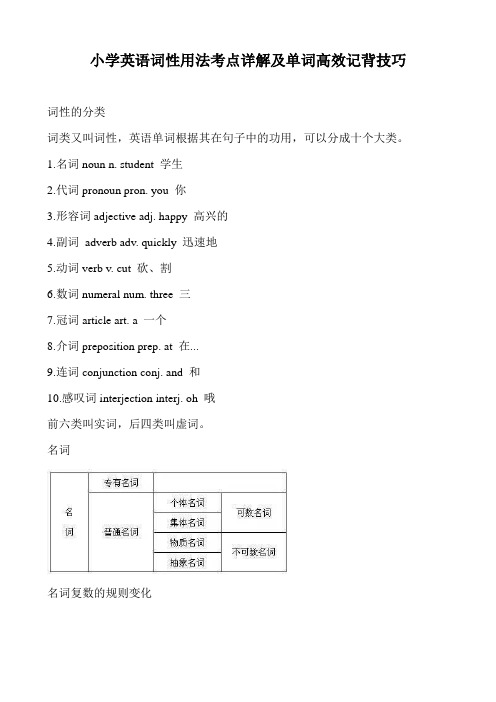
小学英语词性用法考点详解及单词高效记背技巧词性的分类词类又叫词性,英语单词根据其在句子中的功用,可以分成十个大类。
1.名词noun n. student 学生2.代词pronoun pron. you 你3.形容词adjective adj. happy 高兴的4.副词adverb adv. quickly 迅速地5.动词verb v. cut 砍、割6.数词numeral num. three 三7.冠词article art. a 一个8.介词preposition prep. at 在...9.连词conjunction conj. and 和10.感叹词interjection interj. oh 哦前六类叫实词,后四类叫虚词。
名词名词复数的规则变化名词的格在英语中有些名词可以加“‘s”来表示所有关系,带这种词尾的名词形式称为该名词的所有格,如:a teacher’s book。
名词所有格的规则如下:1)单数名词词尾加“'s”,复数名词词尾没有s,也要加“'s”,如the boy‘s bag 男孩的书包,men’s room 男厕所。
2)若名词已有复数词尾-s ,只加“'”,如:the workers’ struggle工人的斗争。
代词大多数代词具有名词和形容词的功能。
英语中的代词,按其意义、特征及在句中的作用分为:人称代词、物主代词、指示代词、反身代词、相互代词、疑问代词、关系代词、连接代词和不定代词九种人称代词的用法:I saw her with them,at least,I thought it was her.我看到她和他们在一起,至少我认为是她。
(her做宾语,them做介词宾语,her作主补)a. -- Who broke the vase?--谁打碎了花瓶?b. -- Me.--我。
并列人称代词的排列顺序1) 单数人称代词并列作主语时,其顺序为:第二人称第三人称第一人称youhe/she;itI如:You, he and I should return on time.2) 复数人称代词作主语时,其顺序为:第一人称第二人称第三人称weyouthey反身代词指示代词指示代词分单数(this / that)和复数(these / those)两种形式,既可作限定词又可做代词,疑问代词指人:who,whom,whose指物:what既可指人又可指物:which冠词冠词是位于名词或名词词组之前或之后,在句子里主要是对名词起限定作用的词。
语法--英语词性分类及用法,句子的分析

注意: 一些以man,woman结尾的合成词,在构成复数时, 与man,woman的变化形式相同。 如:policeman → policemen,
Englishman → Englishmen,
Frenchman→ Frenchmen.
二.副词的分类
1、 时间和频度副词: now, then, often, always, usually, early, today, lately, next, last, already, generally, frequently, seldom, ever, never, yet, soon, too, immediately, hardly, finally, shortly, before, ago, sometimes, yesterday.
有单复数之分。
(4) 抽象名词。如:love, work, life等。一般不可数,没有单 复数之分。
英语不可数名词
不可数名词一般没有复数形式,说明其数量时,要用有关 计量名词。 如:a bag of rice→ two bags of rice,
a piece of paper→ three pieces of paper,
专有名词:
指表示人、地方、 机构、组织等的专有名称。专有名词中实词的
第一个字母要大写。
具体说来它包括人名、国家、地名、月份、星期、节日、书名、 电影名以及某些抽象名词等。 Tony 托尼 August 八月 Japan 日本 Monday 星期一 Mr. Black 布莱克先生 the Great Wall 长城
注意:
英语单词词性的区分方法在填空题的运用

英语单词词性的区分方法在填空题的运用填空题总,判断分析词性是一个很关键的步骤。
下面是分享的英语此行判断区分方法,希望能帮到大家!形容词一般充当定语、表语或补语。
常见构造为:构造1:(不定冠词/定冠词+)+名词。
形容词作定语修饰名词。
构造2:be/get等系动词(+副词)+。
形容词作表语。
构造3:make等使役动词+名词+。
形容词作宾语补足语。
例:Teachers consider learning two languages to be (系动词) too (副词) for children from poor families,believing that the children are already burdened by their home situations.动词可充当任何成分:动词一般作谓语,其分词构造和不定式构造可作主语、宾语、定语、状语或补语。
常见构造为:构造1:名词++名词。
空格前的名词作主语,空格后的名词作宾语,所填词充当谓语动词,且为及物动词。
构造2:名词+(+副词/介词)。
空格前的名词作主语,所填词充当谓语动词,且为不及物动词。
构造3:have/has/had/be+。
空格处为动词的分词形式,与have/has/had构成完成时态;与be构成进展时态或被动语态。
构造4:(连词+)+其它非主要成分,+一个构造完整的句子。
空格处很可能为动词过去分词或现在分词作状语。
过去分词表示与其逻辑主语是被动关系;现在分词表示与其逻辑主语是主动关系。
例:Since children (主语) from poor families often are (助动词) as at-risk for academic failure, teachers believe that advising families to speak English only is appropriate.名词一般充当主语、宾语或表语。
英语单词中都有哪些词性
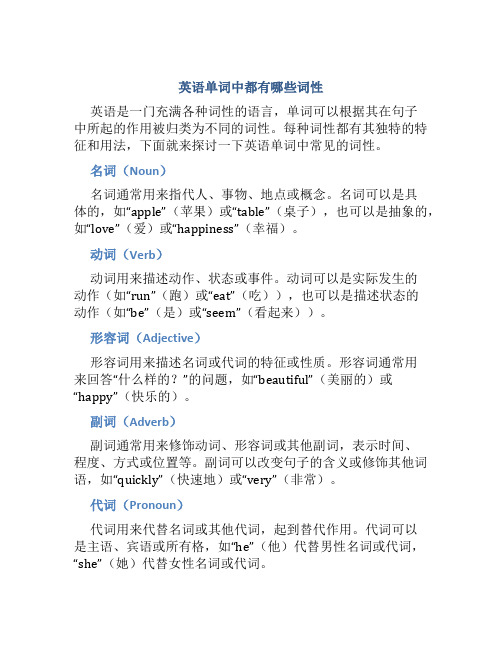
英语单词中都有哪些词性英语是一门充满各种词性的语言,单词可以根据其在句子中所起的作用被归类为不同的词性。
每种词性都有其独特的特征和用法,下面就来探讨一下英语单词中常见的词性。
名词(Noun)名词通常用来指代人、事物、地点或概念。
名词可以是具体的,如“apple”(苹果)或“table”(桌子),也可以是抽象的,如“love”(爱)或“happiness”(幸福)。
动词(Verb)动词用来描述动作、状态或事件。
动词可以是实际发生的动作(如“run”(跑)或“eat”(吃)),也可以是描述状态的动作(如“be”(是)或“seem”(看起来))。
形容词(Adjective)形容词用来描述名词或代词的特征或性质。
形容词通常用来回答“什么样的?”的问题,如“beautiful”(美丽的)或“happy”(快乐的)。
副词(Adverb)副词通常用来修饰动词、形容词或其他副词,表示时间、程度、方式或位置等。
副词可以改变句子的含义或修饰其他词语,如“quickly”(快速地)或“very”(非常)。
代词(Pronoun)代词用来代替名词或其他代词,起到替代作用。
代词可以是主语、宾语或所有格,如“he”(他)代替男性名词或代词,“she”(她)代替女性名词或代词。
介词(Preposition)介词用来表示名词与其他单词之间的关系,如位置、方向、时间或方式等。
介词通常位于名词或代词之前,如“in”(在…里)、“on”(在…上)或“before”(在…之前)。
连词(Conjunction)连词用来连接单词、短语或句子,起到衔接作用。
连词可以连接并列的词组或句子,也可以连接主语与谓语等部分,如“and”(和)、“but”(但是)或“because”(因为)。
冠词(Article)冠词是一类特殊的限定词,用来指示名词的范围或确定名词的特定性。
英语中有两种冠词:定冠词“the”和不定冠词“a”、“an”。
感叹词(Interjection)感叹词用来表示情感、感叹或某种语气。
- 1、下载文档前请自行甄别文档内容的完整性,平台不提供额外的编辑、内容补充、找答案等附加服务。
- 2、"仅部分预览"的文档,不可在线预览部分如存在完整性等问题,可反馈申请退款(可完整预览的文档不适用该条件!)。
- 3、如文档侵犯您的权益,请联系客服反馈,我们会尽快为您处理(人工客服工作时间:9:00-18:30)。
英语单词词性词性尾缀其实很多,大家主要记住最常用的1. 名词后缀1)-or/er/ess/crat/cis:做某件事情或职业的人或物:worker, debtor2)-acy, 表示"性质,状态,境遇" democracy, accuracy, diplomacy3)-ance, -ence表示"性质,状况,行为,过程,总量,程度”importance, diligence, difference, obedience4)-ancy, -ency, 表示"性质,状态,行为,过程" frequency, urgency, efficiency,5)-bility, 表示"动作,性质,状态" possibility, flexibility, feasibility,6)-dom, 表示"等级,领域,状态" freedom, kingdom, wisdom7)-hood, 表示"资格,身份, 年纪,状态" childhood, manhood, falsehood8)-ion, -sion, -tion, -ation, -ition, 表示"行为的过程,结果,状况" action, solution, conclusion, destruction, expression, correction9)-ism, 表示"制度,主义,学说,信仰,行为" socialism, criticism, colloquialism, heroism10)-ity, 表示"性质,状态,程度”purity, reality, ability, calamity11)-ment, 表示"行为,状态,过程,手段及其结果treatment, movement, judgment, punishment, argument12)-ness, 表示"性质,状态,程度" goodness, kindness, tiredness, friendliness13)-ship, 表示"情况,性质,技巧,技能及身份,职业”hardship, membership, friendship14)-th, 表示"动作,性质,过程,状态" depth, wealth, truth, length, growth15)-tude, 表示"性质,状态,程度" latitude, altitude(海拔)16)-ure, 表示"行为,结果" exposure, pressure, failure, procedure(手续),17-grapy, 表示"……学,写法”biography, calligraphy, geography18)-ic, ics, 表示"……学……法" logic, mechanics, electronics, linguistics19)-ology, 表示"……学……论”biology, zoology, technology(工艺学)20)-nomy, 表示"……学……术" astronomy, economy, bionomy(生态学)2. 形容词后缀(1)带有“属性,倾向,相关”的含义1)-able, -ible, visible, flexible2)名词-ish, foolish, bookish, selfish(注意accomplish, vanish)3)-ive, active, sensitive, productive4)-like, manlike, childlike5)名词-ly, manly, fatherly, scholarly, motherly6)-some, troublesome, handsome7)-ful, beautiful, wonderful, helpful, truthful8)-ous, dangerous, generous, courageous, various9)-ent, violent10)-most, foremost, topmost11)less, 表示否定,countless, stainless, wireless3. 动词后缀1)-ize, ise, 表示"做成,变成,……化“modernize, mechanize, democratize, organize2)-en, 表示"使成为,引起,使有”quicken, weaken, soften, harden3)-fy, 表示"使……化, 使成”beautify, purify, intensify, signify, simplify4)-ish, 表示"使,令”finish, abolish, diminish, establish5)-ate, 表示“成为……,处理,作用”separate, operate, indicate4. 副词后缀(形容词)-ly:bad→badly坏地/恶劣地,careful→carefully小心地-wise(OE):clock→clockwise(a./adv.)顺时针方向的(地);like→likewise同样地-wards:out→outwards向外面地,north→northwards向北方地单词词性判断可以在词义的理解及书写句子方面帮助学生。
名词有四数:可数与不可数,单数或复数;限定与动词不可忘。
四数加限定!一.怎样确定名词:一般情况下在下列结构中我们可确定所缺空应为名词◇1.a/an/the +(adj.)+ 名词;a/the book; the rich the disabled the Smiths◇2.adj.+名词; a big stone; a long river; interesting books◇3.adv.+ adj.+名词; a very honest boy◇4.介词+名词;in the room; under construction◇5.形容词性物主代词+名词;my surprise; his honesty◇6. 数词+名词;five girls;◇7.缺的词在句中为主语,表语,宾语时多为名词。
They have books.及时练习1:1.There has been a 30% growth in the ____(市场) for personal computers.3.He has discovered a lot of ___________ (发现) in science .5.I am sorry that I can’t attend the __________(讲座) on American history .6.She started as a successful merchant but ended up as a __________(乞丐).7.There was a surprised _____________(表情)on her face .8.Our city has experienced great ___________(变化)in the past few years9.Please give my _________(祝贺)when you see her .10.Jack took a deep _____________ (呼吸)and then dived into the water.11.Oliver was unable to give police a ______________(描述)of his attack .12.The car was a ____________(廉价货)at the price.动词→名词练习:achieve add argue arriverespondretire rude save sail sell 1. market 3 discoveries 5.lecture 6 beggar 7. expression 8 changes 9. congratulations 10. breath 11. description 12. bargain及时练习2:指出下列文中的名词:In the early 1990s, the word “Internet” was strange to most people. But today, Internet has become a useful tool for people all over the world. Maybe Internet has been the greatest invention in the field of communication in the history of mankind(人类).Communicating with others on the Internet is much faster. We can chat with a person who is sitting in the other part of the world. We can e-mail our friends and they can read the e-mails within a minute.Giving all kinds of information is probably the biggest advantage of the Internet. We can use search engines to find the information we need. Just type in a keyword or keywords and the search engine will give us a list of suitable websites to look at.We can enjoy a lot on the Internet by downloading games, visiting chat rooms or surfing (浏览)websites. There are some games for free. We can meet new and interesting people in the chat now. We can also listen to music and see films.二.怎样确定名词的单数或复数;可数或不可数§确定名词单数或复数的方法:1.由名词前面的数词: 1. I have several ______ (书) on the shelf. 2. This bus can carry 60 (乘客).2.由名词后的动词单数或复数(即主谓一致): The _____ (建议) are reasonable and some of us will accept them.3.由句意: Our ______ (教授) held a meeting about how to improve our English.What is the best-known chain of fast-food (餐馆)in the world.※及时练习3:判断下列名词正误:1. They often have fish, meat and vegetable for supper.2. Mrs. Smith gets well along with her neighbor.3. They had only three meal of soup every day.4. Dickens wrote Oliver Twist in the year 1837 - 1838.5. His new play was a great succeed.6. The animals are useful to the desert people in many way.7. As he explored the sea,he took picture and videos of many thing that people had never seen before.8. They were given kinds of breakfast,and sometimes they got no breakfast at all.9. School child walked with their shirts,coats and anything else they could find pulled up over their nose.10. The middle part of the 20th century brought new ways to help people get over disease.11. Too many trees have been cut this years.12. They use camels for carrying water,food,tents and another things.注意三类名词:1、总是不可数的名词:1) 物质名词:furniture, equipment,2) 抽象名词:advice, progress, news, fun, truth, milk, ink, rice, …2. 根据名词本身的意义:1) 物质名词:water(水水域, rain (雨水2) 抽象名词:experience(经验愉快成功遗憾surprise(惊讶3. 个体名词总是可数名词:book, desk,三.限定词:限定词是位于名词或名词词组之前,对他们在特指、泛指或数量等方面起限定作用的一类词。
